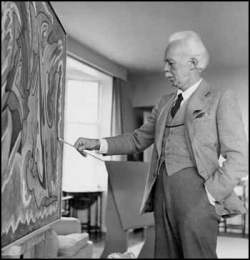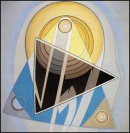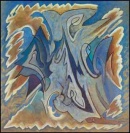Lawren Stewart Harris: Difference between revisions
No edit summary |
|||
| Line 3: | Line 3: | ||
[[File:Lawren Stewart Harris.jpg|right|250px|right|Lawren Stewart Harris with ''Biomorphic Composition'']] | [[File:Lawren Stewart Harris.jpg|right|250px|right|Lawren Stewart Harris with ''Biomorphic Composition'']] | ||
'''Lawren Stewart Harris''', ([[October 23]], 1885 – [[January 29]], 1970) was a Canadian painter, best known as a member the '''Group of Seven''' who pioneered a distinctly Canadian painting style in the early twentieth century. He was a member of the Toronto Lodge of the Theosophical Society in Canada. | '''Lawren Stewart Harris''', ([[October 23]], 1885 – [[January 29]], 1970) was a Canadian painter, best known as a member the '''Group of Seven''' who pioneered a distinctly Canadian painting style in the early twentieth century. He was a member of the Toronto Lodge of the Theosophical Society in Canada. | ||
| Line 11: | Line 9: | ||
<blockquote> | <blockquote> | ||
Harris deeply believed in theosophy, to such an extent that he wrote for [[The Canadian Theosophist (periodical)|''The Canadian Theosophist'']], read papers at conventions, and gave radio talks on the subject. He bothered his friends by zealously handing out or sending them literature about the society... In contrast with the religions in which Harris had been raised, theosophy subscribes to no creed or dogma. It therefore took him above ordinary laws, moral codes, and ethical systems – and gave him greater freedom. Moreover, his passionately held belief had a surprisingly invigorating effect on his life and work: theosophy aims its lessons precisely at self-development. It helped Harris to change his life and to become an abstract artist, as he did in 1934. Once he discovered this new orientation, which meant a profound change in his art practice, theosophy helped him stay committed to creating the abstract paintings – which he described as "purer creative work" – that the painted for the remainder of his life.<ref>Joan Murray, ''Lawren Harris: An Introduction to His Life and Art'' (Toronto: Firefly Books, Ltd., 2003), | Harris deeply believed in theosophy, to such an extent that he wrote for [[The Canadian Theosophist (periodical)|''The Canadian Theosophist'']], read papers at conventions, and gave radio talks on the subject. He bothered his friends by zealously handing out or sending them literature about the society... In contrast with the religions in which Harris had been raised, theosophy subscribes to no creed or dogma. It therefore took him above ordinary laws, moral codes, and ethical systems – and gave him greater freedom. Moreover, his passionately held belief had a surprisingly invigorating effect on his life and work: theosophy aims its lessons precisely at self-development. It helped Harris to change his life and to become an abstract artist, as he did in 1934. Once he discovered this new orientation, which meant a profound change in his art practice, theosophy helped him stay committed to creating the abstract paintings – which he described as "purer creative work" – that the painted for the remainder of his life.<ref>Joan Murray, ''Lawren Harris: An Introduction to His Life and Art'' (Toronto: Firefly Books, Ltd., 2003), 41.</ref> | ||
</blockquote> | </blockquote> | ||
== Artistic career == | |||
=== Gallery === | |||
<gallery widths="130px" heights="150px" perrow="5"> | |||
File:Harris - Atma Buddhi Manas.jpeg|''Atma Buddhi Manas'' | |||
File:Harris - Biometric Composition.jpg|''Biometric Composition'', 1938 | |||
File:Harris - Biomorphic Composition.jpg|''Biomorphic Composition'', 1956 | |||
</gallery> | |||
[[File:Lawren Harris bio.jpg|right|220px|thumb|Joan Murry biography]] | [[File:Lawren Harris bio.jpg|right|220px|thumb|Joan Murry biography]] | ||
Revision as of 16:49, 14 March 2023
UNDER CONSTRUCTION
UNDER CONSTRUCTION
Lawren Stewart Harris, (October 23, 1885 – January 29, 1970) was a Canadian painter, best known as a member the Group of Seven who pioneered a distinctly Canadian painting style in the early twentieth century. He was a member of the Toronto Lodge of the Theosophical Society in Canada.
Involvement with the Theosophical Society
Harris deeply believed in theosophy, to such an extent that he wrote for The Canadian Theosophist, read papers at conventions, and gave radio talks on the subject. He bothered his friends by zealously handing out or sending them literature about the society... In contrast with the religions in which Harris had been raised, theosophy subscribes to no creed or dogma. It therefore took him above ordinary laws, moral codes, and ethical systems – and gave him greater freedom. Moreover, his passionately held belief had a surprisingly invigorating effect on his life and work: theosophy aims its lessons precisely at self-development. It helped Harris to change his life and to become an abstract artist, as he did in 1934. Once he discovered this new orientation, which meant a profound change in his art practice, theosophy helped him stay committed to creating the abstract paintings – which he described as "purer creative work" – that the painted for the remainder of his life.[1]
Artistic career
Gallery
Additional resources
Books
Murray, Joan. Lawren Harris: An Introduction to His Life and Art. Toronto: Firefly Books, Ltd., 2003.
Articles
- Lawren Harris and Theosophy – Part One and Part Two at Theosophy Forward
- Laurence, Robin. "Lawren Harris retrospective chronicles a long, varied journey" at The Georgia Straight. March 11, 2014. Accessed November 2,2016.
Notes
- ↑ Joan Murray, Lawren Harris: An Introduction to His Life and Art (Toronto: Firefly Books, Ltd., 2003), 41.




